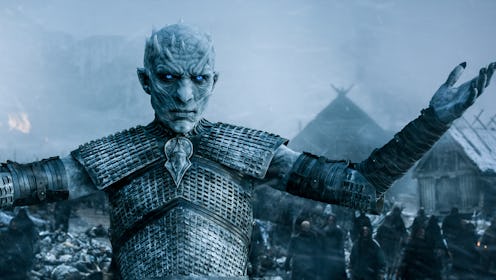
As the followers of the Drowned God say, "What is dead may never die, but rises again, harder and stronger." The most definitive scene in Game of Thrones during 2015 focused on death, but it's not that death you're definitely thinking of. While the betrayal of the Night's Watch and the death of Jon Snow certainly made for memorable events, they acted more as a harbinger of future events than a defining moment of the show's past year as a whole. In fact, the biggest moment of the season, and arguably the defining moment of the entire series so far (Yes, more than Ned's death and the Red Wedding) came in the form of the massacre at Hardhome.
Season 5 of Game of Thrones featured a plethora of non-fatal moments — Cersei being shamed in King's Landing, Cersei riding Drogon to safety, and Sansa's brutal tenure as Ramsay's wife, to name a few — but the massacre at Hardhome spoke to a universal truth about the series as a whole, as well as the world of the viewers at home. This event was about death, yes, but it was about something that's incredibly important to life — perspective.
The Battle of Hardhome has one of the largest body counts of any fight seen on Game of Thrones, and yet it starts as a genuinely peaceful meeting. Jon Snow, despite protests from the men he was meant to rule over, manages to broker peace between the Night's Watch and the Wildlings to fight against a common force — The White Walkers. Jon's awareness of the threat that is approaching Westeros puts him in an important position, requiring him to look beyond the bigger picture of political strife and power struggles. It doesn't matter who the King is when all or Westeros is gone.
That perspective that Jon has is lost on the rest of Westeros. Cersei is too concerned trying to maintain control over King's Landing to worry about matters beyond the wall. It seems as though Daenerys is completely unaware of the White Walkers, even though her dragons may be one of the only creatures that can stop them. Every powerful force in Westeros could, hypothetically, join forces and possibly create an army strong enough to destroy the White Walkers — but they're not concerned with the bigger picture. "Winter is coming" is merely an age-old claim that the citizens throw around, and they do not heed the actual warning because it seems impossible to them that winter coming could be a legitimate threat.
And the White Walkers certainly aren't going to wait for all of Westeros to know that they should be concerned; they don't even wait for the Wildlings and the Night's Watch to finish their discussions before attacking. The White Walkers are a massive, seemingly unstoppable force from a deep land that no man or woman dare enters, and it's not clear what they want aside from death and domination. The attack at Hardhome surprises Jon Snow and the Wildlings almost as much as it once surprised readers of the book, who had no precedent to believe that a slaughter would be occurring and blindside Jon and the others.
The moment you think you're safe is when you're not, and the moment that you assume you've killed a great deal of your enemies' soldiers, their king raises his arms and the dead — yours and theirs — rise to join his army. And, as viewers know all too well, the moment you assume a character can't die because they're the only person that could possibly save Westeros from the threat of the White Walkers is when that character dies (well, at least for a little while). Characters in Game of Thrones rarely think more than one or two steps ahead, and it is always their downfall.
Ned Stark thought only about his family and being a noble man, ignoring that sometimes, in order to work within a broken system you need to break out of your ideas of morality. This, as viewers know, cost him his life. Robb Stark, meanwhile, thought that he could trust guest rights, not thinking that he wouldn't be able to shield his family from knife and sword. Even Jon Snow thought that focusing on the bigger picture was the best way to save Westeros, and he was right, but his narrow-mindedness prevented him from understanding those close to him, which resulted in his death.
At Hardhome, a great many people died. Even though they understood the threat of the White Walkers, they had no idea that the enemy's numbers were in the thousands. They did not suspect that death did not spare someone the fate of becoming a wight. In the world of Game of Thrones, everything you don't know may bring about your death. The only way to succeed is to have a good sense of perspective, not limited by simple solutions and strictly logical thinking. When GoT returns in 2016, keep an open mind and remember that there is always a larger threat, there is always something bigger going on, and sometimes "something bigger" can bring people back from the dead and see them walk through fire. This show teaches its viewers that to succeed in war, one must expand their perspectives and stretch the ideas of what can logically occur.
Image: HBO, Giphy (3)